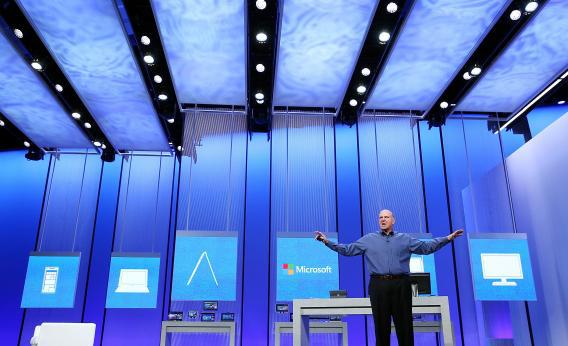Back on Friday while I was on vacation, Microsoft CEO Steve Ballmer announced he’ll be retiring soon, which sent the company’s stock soaring and prompted a lot of retrospectives on the company’s struggles over the past 12 years. I’ve read a lot of smart stuff about that, but one sentiment that I think is wrong is the snarking about how weird it looks in retrospect that the Justice Department used to view Microsoft as such an indomitable adversary that it potentially needed to be broken up.
I think we should take the exact opposite lesson from this. There was nothing foolish about the DOJ’s pursuit of a case against Microsoft, the settlement eventually reached with the company was perfectly reasonable, and what we’ve seen over the past decade or so is very possibly the benefits of that litigation—litigation that, in retrospect, has had no meaningful costs or downsides.
At the time, you’ll recall, Microsoft had clear monopoly pricing power in the personal computer industry. And yet forcing Microsoft to face more competition in PC operating system software seemed totally infeasible. Network effects were king. Everyone was using Windows and Office, so everyone else wanted to use Windows and Office. Forcing the market to become more fragmented would have created lots of problems. But Microsoft already knew that the rise of the World Wide Web threatened to undermine this cozy situation, so they rolled out Internet Explorer and tried to integrate the browser deeply into the Windows operating system. The DOJ called foul, and after a considerable amount of litigation, Microsoft agreed to put much more distance between Internet Explorer and Windows than had previously been the case.
Had that not happened, it’s entirely possible that Microsoft could have used its dominance of the PC marketplace to substantially pre-empt the rise of Google. Imagine a world in which more than 90 percent of people have Microsoft computers that default to a Microsoft Web browser that defaults to a Microsoft-owned search engine. Google search is out there as a kind of niche product for serious nerds, but it never generates the kind of revenue flow necessary to move in to start dominating the webmail and map spaces. Apple still comes along with the incredibly popular iPod series of MP3 players. Steve Jobs still recognizes that the growing power of mobile phones will eventually destroy the market for MP3 players, so Apple needs to make a phone. But with Microsoft-owned Web services for search and mapping dominating the Internet and exclusively available to users of Windows Phone, it’s not possible for rival smartphones to ever go mainstream. Besides, Microsoft turns out to be able to make some pretty good touchscreen phones! And their mail and maps and search clients are all pretty good, too! Everyone says that you just can’t beat Microsoft because Microsoft can hire the best engineers. The only problem is that since this whole teetering empire is built upon utter domination of the traditional personal computer industry, the company as a whole is obsessed with cannibalization. It never wants to come out with a tablet that’s good enough that it convinces people they don’t need to own a PC. It never wants Web services that are so smooth and seamless that people can imagine buying ultracheap browser-only laptops rather than fully powered ones.
The mobile revolution looks more like a slow inching forward, with cutting-edge technology rarely finding marketplace acceptance and market-leading technology rarely being genuinely the best stuff. So adoption of new devices is slower, user engagement with the devices is weaker, investment in app development is slower, and app-based services find it harder to take off.
Now can we promise that Microsoft would have been successful in leveraging its PC monopoly onto the Web without DOJ interference? We cannot. Incumbents often simply stumble in the face of new technologies, and Microsoft very well might have blundered away its edge. But in retrospect it seems to me that they had a pretty smart Web strategy in place as of 1999 that failed largely because the government rightly thought it would not be in the public interest for Microsoft to extend its market power. Forcing browser unbundling preserved the benefits of PC network externalities while opening up a more competitive landscape on the Web, and ultimately via the rise of online services it undermined the significance of the PC monopoly. And yet for all that, more than a decade later, Microsoft remains a highly profitable company where lots of people work and shareholders get dividends and that’s managed to expand successfully into console gaming and corporate services and other things.
